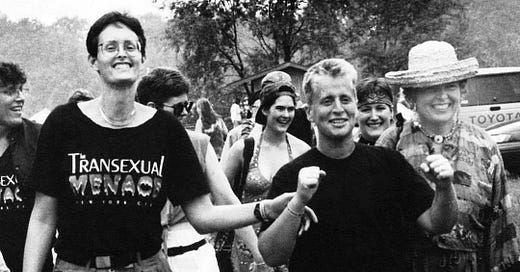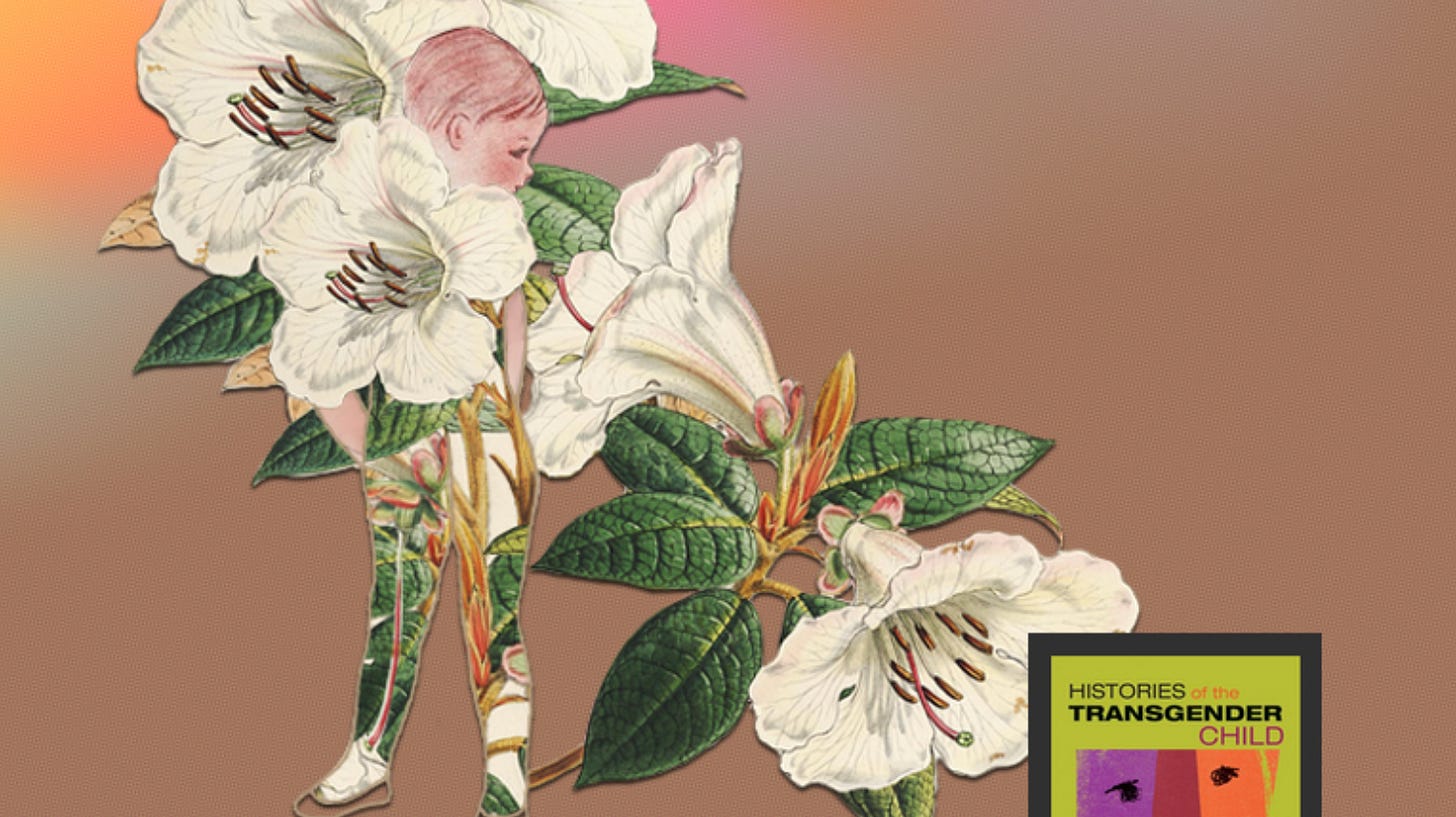You want me to write, on the Trans Day of Visibility?! Just kidding.
As you might have guessed, your resident sad brown girl doesn’t cherish being visible (except maybe visibly hot). I also don’t cherish how visibility has been the exact pretext for the reprehensible bill passed by Arkansas this week.
In honor of the trans kids who deserve to be wanted in this world, and whose respect we adults have failed to earn, I offer three brief elegies, two you can follow to writing I’ve published and one that’s entirely new.
Tap into your rage and love today, friends.
I. “the highest material price for the modern sex and gender binary”
(from the end of Histories of the Transgender Child, p 203)
we need to dethrone singular definitions of transness, including trans childhood, and the multiplication of what transness means is an urgent project for trans children’s livelihoods, as trans children have been forced to stand in for an explanation of trans life for more than a century. Trans children, especially Black trans children and trans children of color, have been forced to pay what amounts to the highest material price for the modern sex and gender binary. To begin to reckon with the immense damage that has caused would mean giving up the obsessive need to see trans children as representatives of something that they are not…and instead greet them as people whose transness is not up for investigation before they are listened to.
II. “I really do wish I could protect them”
(from “On Wanting Trans Women and Children” in The Rambling)
Call it naïve state-phobia; call it phobia of the social, for that matter; call it some kind of fantasized trans separatism masking an even more problematic protectionism; or, call it a phobia of a certain masculinization of trans studies that really likes its dependents, women and children, dead. Whatever it is or isn’t, I find that in spite of what Histories of the Transgender Child says, I really do wish that I could protect trans children from the violence of state power. I really do wish I could shelter them from the casual pleasure with which adults in trans studies regard them as simultaneously spoiled beneficiaries of a lack of suffering in their access to childhood transition and most interesting when they commit suicide. And I really do wish I could protect them from the regime of gendered power that authors the dominant narrative of the world in the grammar of cis. I can’t, and so I don’t have to be on the hook for that desire, but its persistence in the face of its many problems says something.
III. “the relief of ending and then starting again”
(from a forthcoming essay on trans feminism and TERFs)
I can’t help but think of this as a teacher. I returned to campus one fall after a year away on fellowship during which I had also begun my transition. I was, I thought, in the childhood of my womanhood. Add to this the refrain that hormone replacement therapy induces a “second puberty” and I was also an adolescent. I didn’t know how I would handle this and be a professor. At times, I nearly didn’t. Mercifully, the semester saw me teaching a course of my own design on contemporary trans literature. To my immense delight I found my students to be overwhelmingly, and by their own enthusiastic declarations on the first day of the semester, trans and nonbinary. But that delight was accompanied by an immediate an immense weight of responsibility that wore heavy on my adult-trans-child-self. Many of my students, especially those in their first semester of college, had lived publicly trans lives longer than I, including during high school. I experienced them as consequently immensely wise and in a significant way older than me, something that I registered as a deep need for care during a semester where I was struggling to reexperience long dormant, dissociated trauma that transition had reignited in part because I had not lived avowedly trans at their age. Such feelings infantilized me.
And yet I also sense that my students, besieged by the anti-trans present in which we all lived, but one that they perhaps absorbed more anxiously than I, also desperately needed me as a grown trans woman. That I needed to incarnate for them a basic, living possibility for trans futurity in femme and brown form by showing up every week to teach, to be “gay as hell” (as they put it), and to confer on them the hope of collective persistence, of love. And so, I had to “grow up” right before their eyes each week, even as I tried to tell them it was safe, in my classroom, to feel our shared weakness of being young and trans in this world.
The pain and honor of our four months together was something about how our classroom forced us out of bed, into a room with our kin, and kept time for us by making space. How awful it felt, at the end of term, to say goodbye. I felt the naked fear of not being able to see them twice a week and thereby know, if only visually, that they were alive, that they were breathing, that they were thinking and laughing and recognizing in one another a personhood so rarely acknowledged outside of our classroom. Encrypted inside that fear and the temptation for me to play a protective role, a second feeling: the sorrow that I, too, would be without them. That I would have to live and try to live well enough, on my own, without their demand for my presence, for they were not my children after all. For weeks after the end of the semester I would wake up in the middle of the night from a nightmare, worried about one or another student. Eventually, those dreams started to fade. And a year later, when I stepped back into the classroom to teach that course again, I felt the tender sweetness of seeing that we had found each other yet again. That we would get to do it all again. That what can’t last forever, or guarantee life, also offers the relief of ending and then starting again.




